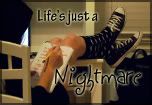Well, here you have it. The last day of
It's been a crazy ride, but all things must come to a conclusion (the epilogue to the preverbial book, if you will). And, for this closing day, I bring you my review of ISIS and my interview with the fabulous author, Douglass Clegg. Title: Isis
Title: Isis
Author: Douglas Clegg
Pages: 111
Recieved from: author
Summary:
If you lost someone you loved, what would you pay to bring them back from the dead?
Old Marsh, the gardener at Belerion Hall, warned the Villiers girl about the old ruins along the sea-cliffs. “Never go in, miss. Never say a prayer at its door. If you are angry, do not seek revenge by the Laughing Maiden stone or at the threshold of the Tombs. There be those who listen for oaths and vows….What may be said in innocence becomes flesh and blood in such places.”
She was born Iris Catherine Villiers. She became Isis.
From childhood until her sixteenth year, Iris Villiers wandered the stone-hedged gardens and the steep cliffs along the coast of Cornwall near her ancestral home. Surrounded by the stern judgments of her grandfather-the Gray Minister-and the taunts of her cruel governess, Iris finds solace in her beloved older brother who has always protected her.
But when a tragic accident occurs from the ledge of an open window, Iris discovers that she possesses the ability to speak to the dead…
Be careful what you wish for…it just may find you.
A prime example of the term, "less is more," Isis was a wonderfully haunting, atmospheric and most importatly heartbreaking read that I found myself re-reading as soon as I was finished with the last paragraph.
At only 111 pages, Isis is far from a Stephan King thriller. Iris Villiers lives at the gothic Belerion Hall with her aging mother, manic grandfather, and twin brothers, Spence and Harvey. While she certainly isn't happy, she is content as long as Harvey is there with her. But, at sixteen, a young, wicked servent moves in to the mansion, intent on making Iris' life as miserable as possible. During an unfortunate insident involving some pictures, a library and an unfortunatly placed window, Iris' beloved brother Harvey falls to his death in the garden, cushioning her own fall. But life is hollow without her brother, and Iris will do anything to bring him back.
Keep in mind that this is proceeded by seventy-odd pages of maddened rants of the dead and how they should never, under any circumstances, be brought back. By Old Marsh, Spence, Iris and Harvey are all told stories of people who were spited because of their desire to bring back the dead. I mean, there's a tomb outside the people's house. So the events that befall Iris isn't exactly surprising to me as a reader and, while I found myself a bit dissapointed at the predicibility of Clegg's novella, I was just as strongly--perhaps stronger--impressed with the beautiful scenery, illustrations and plain heartbreaking prose.
It's hard to say what the message behind Isis is--that the dead are meant to stay dead? the love of one's siblings? perhaps just be careful what you wish for?--but whatever it was, I got it loud and clear. The atmosphere and characters were so engaging I couldn't tear my eyes away. While the placing was a bit uneven, everything is just so lovely and horrifying and terribley sad that it will leave you with a pleasent--and perhaps heartbroken--aftertaste.
I loved the illustrations. They were so sad and so creepy (maybe a little less so then Scary Stories to Tell in the Dark) and OMG you guys I wanted to cut them out and stick them on my notebook and look at them all day.

Rating: 8 out of 10--gorgeous, fantastic, dark, sad, and creepy.
Also: I was going to have an interview with the author--oh, look!

First off, thanks so much for stopping by to chat about your newest novel, Isis. Let's start with some basics; what got you into writing?
Before the age of eight, I made up a lot of stories for myself and drew them in my sketch pad with just a few lines from the story in the drawings. I was fairly serious about art as a kid, and my mother was somewhat of an artist and taught me some techniques early.
Sometime during my eighth year, a pet mockingbird died and I was sad, so I drew it on my sketch pad. Then, my mother brought me a typewriter and told me to write a story about the bird.
So, I did, and then I just taught myself to type. I began writing stories and decided I’d be a writer. I kept the door open a bit for filmmaking, because I had an interest in it, but by the time I graduated high school I was fairly certain I’d be a writer.
Writing has always saved my life, and it’s bigger than my life.
What was your inspiration for Isis? Any primary influences?
My primary influence was human nature and having to go through the loss of people I've loved. From there, I began writing about a girl who has what might be seen as both an idyllic young life and a very cold, isolated existence. And when the only truly caring person in her life dies, she decides she will bring him back from the dead.
From that, I saw parallels with the story of Isis and Osiris, which plays a part in the book.
I set it in the late 19th century for several reasons, the primary one being that I love stories set in the late 19th century, but also, historically, to place her just before technology hit in a big way. I also wanted to position the story far enough away from the contemporary world to give it a kind of fabled aspect and bring it closer to the world of Hawthorne, Poe, M.R. James and W.W. Jacobs.
Many of your novels gear towards the supernatural horror genre. Is there any particular reason for this, or does it just happen?
I love supernatural fiction, and I’ve written horror, suspense and fantasy fiction and I love all three.
I tend to sit down and write a story, and later discover whatever genre it’s going to be attached to – but I do love the supernatural in its fictional forms. I think when I write about the supernatural, I have a freedom in describing human nature when pitted against the unknowable. I also love horror fiction and have – within the past few years -- discovered an intense love for fantasy, itself, but I tend toward dark fantasy.
Any characters based off friends or family?
Not particularly, although my observations of people I’ve known as well as people I haven’t known definitely influence how I understand people at all.
I’ve experienced the deaths of friends and family, and I understand Iris Villiers – the protagonist of Isis – and her desire to defy death itself. I think a lot of life is about denying the finality of death. It exists and none of us wants to think about it until we absolutely have no choice.
There's a game to go along with Isis--where did you come up with it?
I didn’t. My friend Matt Schwartz, of Shocklines.com, suggested I try a game as a way of getting word out on the book, particularly since Glenn Chadbourne had produced these beautiful illustrations. He put me in touch with a game developer who took Glenn’s illustrations and added color and a “Spot the Difference” game aspect and then distributed it to dozens of casual gaming sites.
The game for Isis is primarily a promotion for the book – or an ad – yet the game itself is fun and doesn’t require that anyone playing it notice the book if they don’t wish to do so. More than 2 million people have played the Isis game, so it was a great way to promote a title and yet not get annoying with the promotion.
And anything that further publicizes the talents of Glenn Chadbourne is worth doing.
Did you begin Isis with a YA audience in mind?
No, I thought of a good story and decided to develop it. If I sat down and thought of the audience’s age whenever I wrote, I’d probably stop writing. A good story is for everybody.
Do you get writer's block and, if so, how do you overcome it?
I suspect writer’s block is a lack of confidence or an inability to find a story or subject that gets a writer excited.
I’ve had periods where I shift gears and don’t write for awhile, but I can’t call that writer’s block but a need to keep finding what interests me and learn more about life and human nature.
I recently took a couple of years off from writing novels and focused on some novellas, and also spent a lot of time re-reading Greek drama and certain Shakespeare plays and a lot of fiction that I consider great both for enjoyment and also to further understand this craft. Even after 20 years of writing fiction for a living, I still want to learn.
But writer’s block? Knock wood, but it hasn't happened to me.
Sell Isis over twitter (140 characters or less)
I’m afraid I wouldn’t know how. All I can do is mention Isis and hope people enjoy it.
If you could meet any of your characters, would you give them spoilers?
Do you mean spoil the plot of their lives? Of course not. The adventure in life is in the not-knowing and the constant ability to be surprised. I would hate to know what happens next in my life – half the fun is turning a corner and finding out when it happens.
During my customary pre-author interview website trolling, I notice you've listed quite a foray of early jobs, including Insect Zoo keeper and hamburger flipper. Any horror stories you'd like to share?
I started working at 12 and a lot of those jobs happened before I was 20. I loved working at the Smithsonian in the Insect Zoo – bugs would escape and we’d be gathering them off of mummies that had been brought up from Central America, or we’d pitch in to uncrate stuff in the truly magical Smithsonian basement in the Natural History museum or I’d spend my entire day with a beehive or a tarantula or hissing cockroaches. I loved it.
As a hamburger flipper, I worked at a Roy Rogers in Seven Corners, Virginia at 16 and sliced open the palm of my left hand on the roast beef cutter (I still have a small crescent scar left to prove it.)
The great thing about any experience -- when you’re a writer – is that, no matter how bad it seems at the time, it’s great background material for fiction. I always knew I would write fiction, so even in the more annoying jobs, I’d think: soak it up, you can write about it later.
You’re on a desert island. You have with you ONE book, ONE television show and ONE movie--what are they?
I wouldn’t need a book, a TV show or a movie. I’d just make stories up, one after the other, to while away the time. After all, if I picked one of each of those categories, I’d be bored with it within a week. But the stories I could create would be endless and I’d be the only reader I’ve ever have to satisfy.
If the yams, coconuts and mangoes were plentiful, and I could catch some fish and find some bird's eggs – and of course collect good rainwater…I don’t know, I might just enjoy that for a year or four.
What's next for you?
My novel Neverland hits bookstores in the spring, in a beautifully-illustrated edition – again, Glenn Chadbourne created a unique look for this book that’s different than what he created for Isis. Neverland is a southern gothic set in the 1960s about a boy who plays a series of games in a rundown shack that become more and more terrifying. It takes place on a fictional island off the coast of Georgia, and deals with family secrets and lies.
It's set in the '60s as a kind of nostalgia I have from my own childhood, since I was a little kid in those days.
Any advice for young writers?
Find what you love and follow it.
Thanks for stopping by, and I can't wait to see what you have in store :)
Thank you, Danielle, for such a thoughtful interview.
He wrote his first novel in Los Angeles. It was called Goat Dance, and was sold in 1987, and published in 1989 by Simon & Schuster’s Pocket Books — launching Clegg’s career as a novelist.
Douglas Clegg began writing a book a year — sometimes more — from then on, as well as dozens of short stories.
He has primarily written supernatural fiction — from horror to fantasy to psychological suspense with a paranormal edge. His fiction-writing career currently spans about 20 years of constant writing and publication.
Since then, he’s seen more than 20 books published — and they keep coming.
Additionally, he’s been Director of Marketing for a publisher, editor for a bookstore’s website, a marketing consultant for publishers, publicity firms, and booksellers — and a wrangler for the cats, dogs and rabbits that have occupied his home. He has also co-authored the book Buzz Your Book with M.J. Rose. The two have also written a screenplay together. So far, these are Clegg’s only collaborations.

















1 comments:
Oh! That book sounds awesome! I can't wait to read it :)
Post a Comment